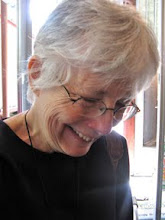I'm currently reading The Wisdom Jesus by Cynthia Bourgeault. She mentions this Gospel and describes it as more of a koan than a parable, explaining that these teachings are not about the outer activities they describe, but are about inner transformation. Of course the wise virgins couldn't share their oil, she says, because the oil stands for some quality created inside us "by our own conscious striving." She also goes on to explain that we wouldn't get that connection unless we understood that Jesus is teaching from a specific Hebrew Wisdom Tradition.
Interesting. That falls right into place with another book I'm reading by John Shelby Spong: Jesus for the Non-Religious.
Both authors assert that Jesus cannot be fully understood until we place him in the Jewish context he was born into. Okay, I'm game for that. But... both books are also difficult reading for different reasons. Spong, already in the first chapter, has eliminated the wise men, the virgin Mary, Joseph, Bethlehem and all the singing angels. Just think of all the Christmas carols we'd have to scrap if we all agreed he's accurate in his assessment. Just think of all the amazing music and artwork over the centuries, not to mention my own lame attempts to portray these miracles. We'd probably have to eliminate Christmas too... and that's my favorite holiday.
Both authors assert that Jesus cannot be fully understood until we place him in the Jewish context he was born into. Okay, I'm game for that. But... both books are also difficult reading for different reasons. Spong, already in the first chapter, has eliminated the wise men, the virgin Mary, Joseph, Bethlehem and all the singing angels. Just think of all the Christmas carols we'd have to scrap if we all agreed he's accurate in his assessment. Just think of all the amazing music and artwork over the centuries, not to mention my own lame attempts to portray these miracles. We'd probably have to eliminate Christmas too... and that's my favorite holiday.
Not that I don't believe Spong will give adequate and excellent examples of why Jesus should still be revered as God's son; I have complete faith that he will. I'm just too blown away at the moment by losing all the lovely mythology around the birth of the Christ, (whether it's true or not.)
But back to Sunday's sermon. Joshua charges the people of Israel: "Choose for yourself whom you will serve." And he gives them a lot of choices. There were nearly three thousand minor deities available to them in that time, a time when they believed that the power struggles in the heavenly realms directly affected the outcomes on the earthly plane. The more worshipers a god could command, the more powerful he or she would be. As I was listening, I realized just how awful a choice Joshua was asking at that time. The God of Israel, by His own admission, was a jealous God. God was a green-eyed monster? You read some of the Old Testament accounts and that's not too far-fetched. Makes you want to think twice if this is the one you will serve. Yet they all agreed. The faithfulness of Israel, whatever their motivations, has given us the world we now inhabit.
We too, have that choice. The words choose today ring the truest, though. It is a daily choice. Every day. Day-in and day-out. Saying yes once won't cut it. It has to be a vow renewed with every breath. Choose today whom you will serve.






